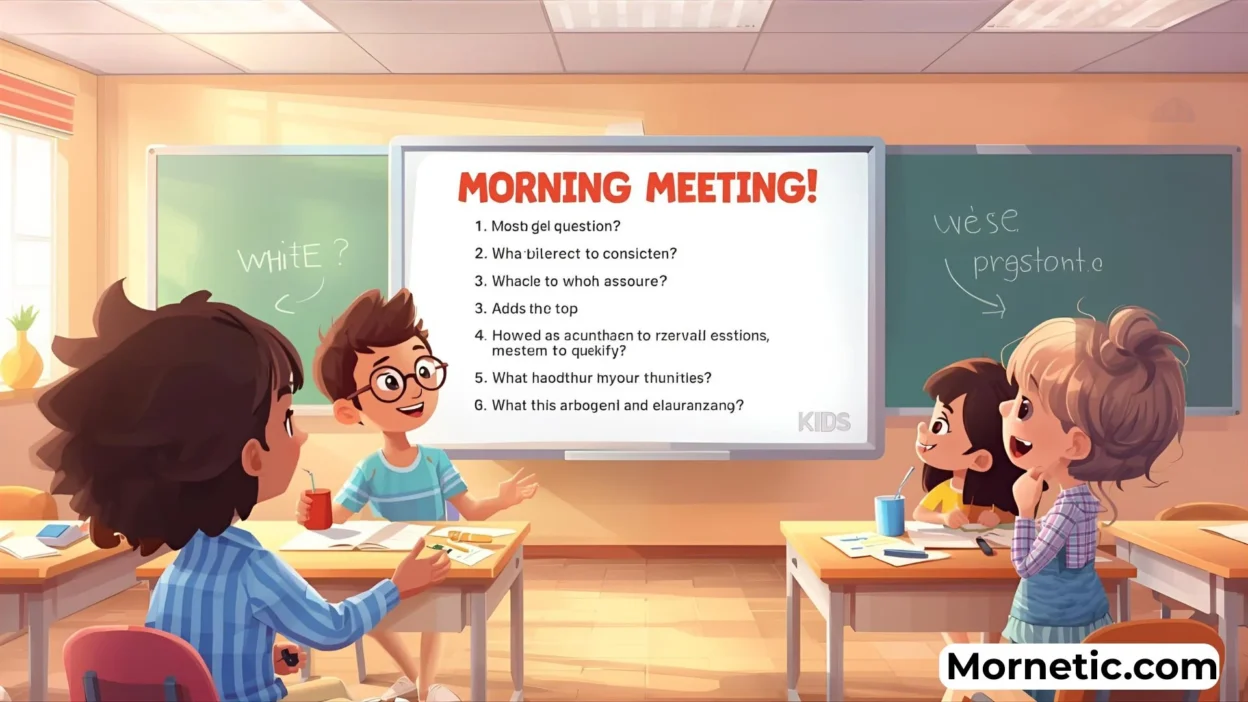Morning meetings have revolutionized classroom culture, creating spaces where students feel valued, connected, and ready to learn. When you start each day with intentional morning meeting questions for kids, you’re not just building routine—you’re building relationships, enhancing communication skills, and fostering an inclusive classroom environment. This comprehensive guide provides everything you need to implement engaging morning meetings with questions that spark meaningful conversations, promote social-emotional learning, and set a positive tone for the entire school day.
Why Morning Meeting Questions Matter: Beyond Simple Icebreakers
Morning meeting questions for kids serve a much deeper purpose than simple conversation starters. When implemented effectively, they become powerful tools for building classroom community and supporting holistic child development. The daily practice of gathering in a circle to share thoughts, experiences, and feelings creates a predictable ritual that helps students transition from home to school mindset.
Research shows that classrooms implementing regular morning meetings see significant improvements in:
- 📈 Academic engagement and participation
- 🤝 Social skills and peer relationships
- 😊 Emotional intelligence and self-awareness
- 🏫 Classroom climate and sense of belonging
Teachers consistently report that the 15-20 minute investment in morning meetings pays substantial dividends throughout the school day, resulting in improved classroom management and more productive learning time.
How to Structure Effective Morning Meetings
The most successful morning meetings follow a consistent framework that balances predictability with variety. The Responsive Classroom model provides an effective four-component approach:
Greeting (2-3 minutes): Students welcome each other by name
- Handshakes, high-fives, or verbal greetings
- Eye contact and using names correctly
- Cultural variations and languages
Sharing (8-10 minutes): Students respond to focused prompts
- Structured turn-taking
- Active listening skills
- Follow-up questions
Group Activity (5-7 minutes): Quick games or brain breaks
- Team-building challenges
- Movement activities
- Cooperative games
Morning Message (2-3 minutes): Preview the day ahead
- Written message with errors to correct
- Response questions
- Daily schedule preview
Age-Appropriate Morning Meeting Questions for Every Grade Level
🎒 Kindergarten and Early Elementary (K-2)
- If you could have any animal as a class pet, what would it be? 🐾
- What’s your favorite thing to do on the playground?
- Did you have any fun dreams last night?
- What’s one thing you’re looking forward to today?
- Can you tell us about something kind you did yesterday?
- If you could build a castle out of anything, what would you use?
- What’s your favorite thing to draw or color?
- What makes you feel happy when you’re sad?
📚 Upper Elementary (3rd-5th Grade)
- If you could choose any career for a day, what would you choose?
- What’s something that challenged you recently?
- If you could invent something to make the world better, what would it be?
- What’s the most interesting thing you’ve learned this week?
- What’s one goal you have for yourself this month?
- If you could trade lives with any fictional character, who would it be?
- What’s one thing you wish adults understood about being your age?
- What does being a good friend mean to you?
🚂 Middle School (6th-8th Grade)
- If you could meet any historical figure, who would it be?
- What’s one skill you’ve always wanted to explore?
- What’s your favorite way to relax after a long day?
- If you could give advice to your younger self, what would it be?
- What’s one thing you’re determined to accomplish this semester?
- How do you handle stress or pressure?
- What world issue concerns you most right now?
- What qualities do you value most in friends?
Seasonal and Timely Questions for 2025
🍂 Fall Themes
- What’s your favorite fall tradition with family or friends?
- If you could design the perfect Halloween costume for 2025, what would it be?
- What are you most thankful for this year?
- How do you like to enjoy the changing leaves?
- What does your perfect autumn day look like?
❄️ Winter Themes
- If you could create a new winter holiday, how would people celebrate?
- What’s the best act of kindness you’ve witnessed recently?
- How do you stay positive during shorter days?
- What winter activity brings you the most joy?
- What gift would you most like to give someone?
🌸 Spring Themes
- What signs of spring have you noticed?
- If you could plant a garden with any three things, what would you grow?
- What does “new beginnings” mean to you?
- How will you make the most of longer days?
- What would you like to improve about yourself this spring?
☀️ Summer Themes
- What are you most looking forward to this summer?
- If you could take an imaginary vacation anywhere, where would you go?
- What’s your favorite summer memory?
- How can we carry summer relaxation into school days?
- What new thing do you hope to try this summer?
Social-Emotional Learning Questions
Self-Awareness
- What are three words that describe you?
- When do you feel most proud of yourself?
- What makes you feel nervous or anxious?
- What helps you calm down when you’re upset?
- What are you better at now than last year?
Empathy and Perspective
- How can we make new students feel welcome?
- When have you noticed someone needing help?
- How do you think your friend felt when that happened?
- Who in our school might need extra kindness today?
- What does “walking in someone else’s shoes” mean to you?
Growth Mindset
- What’s a challenge you’ve overcome recently?
- What mistake taught you something important?
- When something is hard, what helps you keep trying?
- What would you try if you knew you couldn’t fail?
- How do you encourage yourself when things get difficult?
Fun and Creative Questions to Spark Imagination
Imaginative Scenarios
- If you could have any superpower, what would it be? 🦸
- If you could be any animal for a day, which would you choose?
- If you could design your dream house, what would it include?
- If you could time travel, where and when would you go?
- If you could create a new ice cream flavor, what would it be?
Humorous and Lighthearted
- What animal would make the best president?
- If you could rename our school, what would you call it?
- What’s the funniest thing you’ve ever seen?
- If you were a superhero, what would your name be?
- What’s the best joke you’ve ever heard?
Preference and Opinion
- Would you rather talk to animals or read minds?
- What’s your favorite way to spend a rainy day?
- If you could only eat one food forever, what would it be?
- Would you rather travel everywhere or fly to space?
- What’s your favorite after-school activity?
Interactive Morning Meeting Activities
Icebreakers and Community Builders
- Two Truths and a Lie: Guess which statement is false
- Compliment Circle: Give genuine compliments to neighbors
- Classmate Interviews: Partner share and introduce each other
- Find Someone Who: Discover common interests
- Bucket Fillers: Share ways to spread kindness today
Movement and Energy Boosters
- Stretching Session: Simple yoga poses or stretches
- Dance Break: 60 seconds of dancing to upbeat music
- Animal Walks: Move like different animals around the room
- Follow the Leader: Copy movements around the circle
- The Wave: Create waves with hand motions or standing/sitting
Games and Brain Teasers
- Riddles: Solve puzzles together
- 20 Questions: Guess the object with yes/no questions
- Charades: Act out words or phrases
- Alphabet Game: Name items in categories A-Z
- Word Chain: Continue words with last-letter connections
Ready-to-Use Morning Meeting Outlines
20-Minute Complete Meeting
Greeting (3 min): “Butterfly Handshake” – hook thumbs and wave fingers while greeting neighbors
Sharing (10 min): “What’s one small goal for today, and what might make it challenging?” (3-4 students with follow-up questions)
Activity (5 min): “Group Juggle” – toss a soft ball around circle while saying names, try to beat speed record
Message (2 min): Read daily preview with one intentional error to identify
10-Minute Express Meeting
Greeting (2 min): Quick wave with “Good morning, [name]!”
Sharing (6 min): “Would you rather talk to animals or read minds? Why?” (5-6 quick responses)
Activity (2 min): Three deep “balloon breaths” together
5-Minute Connection Meeting
Greeting (2 min): “Roll the Ball” – greet and roll ball to next person
Sharing (3 min): One-word weather report for feelings (“sunny,” “cloudy,” “stormy”)
Implementation Tips for Success
Creating Safe Space
- Establish clear listening expectations
- Allow “pass” option for reluctant sharers
- Model vulnerability in your own responses
- Celebrate all contributions equally
- Maintain confidentiality within the group
Maintaining Engagement
- Use themed days (Mindset Monday, Thankful Thursday)
- Incorporate props or visual aids
- Voice question types and formats
- Include student-generated questions
- Connect questions to current curriculum
Managing Challenges
- Use talking stick for turn-taking
- Provide advance notice of questions
- Offer alternative response methods (drawing, writing)
- Address concerning responses privately
- Adjust time based on attention spans
Digital and Hybrid Adaptations
Virtual Meeting Strategies
- Use breakout rooms for pair shares
- Employ chat features for responses
- Share screen for morning messages
- Utilize polling for quick check-ins
- Create digital greeting routines
Engaging Remote Participants
- Send questions in advance
- Encourage virtual backgrounds related to topics
- Incorporate at-home movement activities
- Use reaction buttons for active listening
- Record sessions for absent students
Measuring Impact and Success
Look for these positive indicators that your morning meetings are working:
- ✅ Students reference each other’s shares during the day
- ✅ Reluctant participants begin sharing voluntarily
- ✅ Conflict resolution improves among classmates
- ✅ Students use emotional vocabulary more precisely
- ✅ Classroom climate feels more supportive and joyful
- ✅ Academic collaboration increases naturally
Ask for student feedback periodically: “What’s your favorite type of morning meeting question?” or “How could our meetings be even better?”
Conclusion: Building Community One Question at a Time
Morning meeting questions for kids transform classroom culture by creating daily opportunities for connection, reflection, and growth. The consistent practice of gathering to share, listen, and connect builds the foundation for a learning environment where every child feels valued and ready to learn.
Start with just a few questions that resonate with your students, establish clear routines, and watch as your classroom community grows stronger each day. The investment of 15-20 minutes each morning returns priceless dividends in student engagement, social-emotional development, and academic success throughout the entire school year.

Grace is a lifestyle writer from California who loves starting mornings with positivity. At Mornetic, she shares uplifting quotes and cheerful messages to brighten your day.




